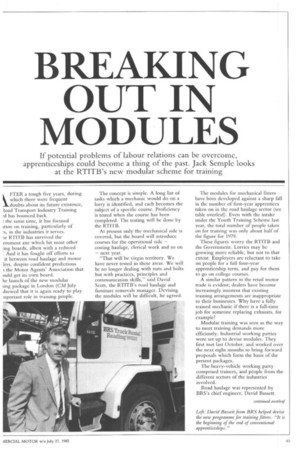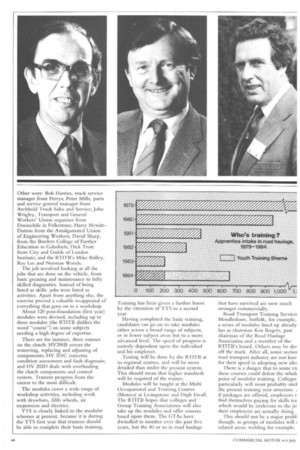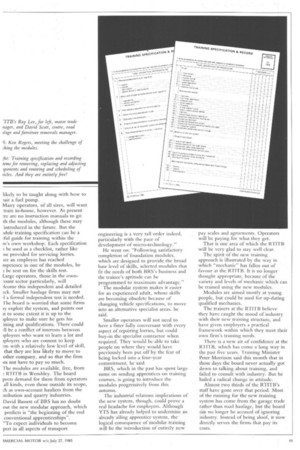BREAKING OUT IN MODULES
Page 45

Page 46

Page 47

If you've noticed an error in this article please click here to report it so we can fix it.
If potential problems of labour relations can be overcome, apprenticeships could become a thing of the past. Jack Semple looks at the RTITB's new modular scheme for training
FTER a tough five years, during which there were frequent doubts about its future existence, oad Transport Industry Training xi has bounced back.
: the same time, it has focused ition on training, particularly of -s, in the industries it serves.
le RTITB has survived the eminent axe which hit most other .ing boards, albeit with a reduced 1 And it has fought off efforts to it between road haulage and motor lers, despite confident predictions i the Motor Agents' Association that ould get its own board.
he launch of the new modular ling package in London (CM July showed that it is again ready to play nportant role in training people. The concept is simple. A long list of tasks which a mechanic would do on a lorry is identified, and each becomes the subject of a specific course. Proficiency is tested when the course has been completed. The testing will be done by the RTITB.
At present only the mechanical side is covered, but the board will introduce courses for the operational side — costing haulage, clerical work and so on — next year.
"That will be virgin territory. We have never tested in these areas. We will be no longer dealing with nuts and bolts but with practices, principles and communication skills," said David Scott, the RTITB's road haulage and furniture removals manager. Devising the modules will be difficult, he agreed. The modules for mechanical fitters have been developed against a sharp fall in the number of first-year apprentices taken on in the road haulage sector (see table overleaf). Even with the intake under the Youth Training Scheme last year, the total number of people taken on for training was only about half of the figure for 1979.
These figures worry the RTITB and the Government. Lorries may be growing more reliable, but not to that extent. Employers are reluctant to take on people for a full four-year apprenticeship term, and pay for them to go on college courses.
A similar pattern in the retail motor trade is evident; dealers have become increasingly insistent that existing training arrangements arc inappropriate to their businesses. Why have a fully trained mechanic if there is a full-time job for someone replacing exhausts, for example?
Modular training was seen as the way to meet training demands more efficiently. Industrial working parties were set up to devise modules. They first met last October, and worked over the next eight months to bring forward proposals which form the basis of the present packages.
The heavy-vehicle working party comprised trainers, and people from the different sectors of the industries involved.
Road haulage was represented by BRS's chief engineer, David Bassett. Other were Bob Harries, truck service manager from Perrys; Peter Mills, parts and service general manager from Archbold Truck Sales and Service; John Wrigley, Transport and General Workers' Union organiser from Dormobile in Folkestone; Harry HewittDutton from the Amalgamated Union of Engineering Workers; David Sharp, from the Borders College of Further Education in Galashiels; Dick Trott from City and Guilds of London Institute; and the RTITB's Mike Ridley, Ray Lee and Norman Woods.
The job involved looking at all the jobs that are done on the vehicle, from basic greasing and maintenance to fully skilled diagnostics. Instead of being • listed as skills, jobs were listed as activities. Apart from anything else, the exercise proved a valuable re-appraisal of everything that goes on in a workshop.
About 120 post-foundation (first year) modules were devised, including up to three modules (the RTITB dislikes the word "course") on some subjects needing a high degree of expertise.
There are for instance, three courses on the clutch: HV200B covers the removing, replacing and adjusting of components; HV 201C concerns condition assessment and fault diagnosis; and HV 202D deals with overhauling the clutch components and control system. Trainees progress from the easiest to the most difficult.
The modules cover a wide range of workshop activities, including work with drawbars, fifth wheels, air suspension and electrics.
YTS is closely linked to the modular schemes at present, because it is during the YTS first year that trainees should be able to complete their basic training. Training has been given a further boost by the extension of YTS to a second year.
Having completed the basic training, candidates can go on to take modules either across a broad range of subjects, or in fewer subject areas but to a more advanced level. The speed of progress is entirely dependent upon the individual and his employer.
Testing will be done by the RTITB at its regional centres, and will be more detailed than under the present system. This should mean that higher standards will be required of the trainee.
Modules will be taught at the Multi Occupational and Training Centres (Motecs) at Livingstone and High Ercall. The RTITB hopes that colleges and Group Training Associations will also take up the modules and offer courses based upon them. The GTAs have dwindled in number over the past five years, but the 40 or so in road haulage that have survived are now much stronger commercially.
Road Transport Training Service Mendlesharn, Suffolk, for example, a series of modules lined up already has as chairman Ken Rogers, past chairman of the Road Haulage Association and a member of the RTITB's board. Others may be slo, off the mark. After all, some sectioi road transport industry are not kno• for their speed in adopting new idea
There is a danger that to some ex these courses could defeat the wholt point of modular training. Colleges particularly will most probably sticl the present training year structure. if packages are offered, employers ti find themselves paying for skills tra which would be irrelevent to the jo their employees are actually doing.
This should not be a major probl, though, as groups of modules will related areas; welding for example,
likely to be taught along with how to >air a fuel pump.
Many operators, of all sizes, will want train in-house, however. At present re are no instruction manuals to go th the modules, although these may introduced in the future. But the niule training specification can be a :ful guide for training within the m's own workshop. Each specification be used as a checklist, rather like pse provided for servicing lorries. ice an employee has reached mpetence in one of the modules, he be sent on for the skills test.
Large operators, those in the own:ount sector particularly, will dcome this independent and detailed ack. Smaller haulage firms may not a formal independent test is needed. The board is worried that some firms iy exploit the system, and points out it to some extent it is up to the iployee to make sure he gets his ining and qualifications. There could :II be a conflict of interests between iployees who want to learn a lot and iployers who are content to keep with a relatively low level of skill, that they are less likely to move to other company, and so that the firm .es not have to pay so much.
The modules are available, free, from RTITB in Wembley. The board pects demand for them from operators all kinds, even those outside its scope, 211 as own-account hauliers from the Aribution and quarry industries. David Bassett of BRS has no doubt out the new modular approach, which predicts is "the beginning of the end conventional apprenticeships". "To expect individuals to become pert in all aspects of transport engineering is a very tall order indeed, particularly with the pace of development of micro-technology."
He went on: "Following satisfactory completion of foundation modules, which are designed to provide the broad base level of skills, selected modules that fit the needs of both BRS's business and the trainee's aptitude can be programmed to maximum advantage."
The modular system makes it easier for aii experienced adult, whose skills are becoming obsolete because of changing vehicle specifications, to move into an alternative specialist areas, he said.
Smaller operators will not need to have a fitter fully conversant with every aspect of repairing lorries, but could buy-in the specialist contractor when required. They would be able to take people on where they would have previously been put off by the fear of being locked into a four-year commitment, he said.
BRS, which in the past has spent large sums on sending apprentices on training courses, is going to introduce the modules progressively from this autumn.
The industrial relations implications of the new system, though, could prove a real headache for employers. Although YTS -has already helped to undermine an already ailing ap,prentice system, the logical consequence of 'nodular training will be the introduction of entirely new pay scales and agreements. Operators will be paying for what they get.
That is one area of Which the RTITB • will be very glad to stay well clear. "
The spirit of the new training approach is illustrated by the way in which "mechanic" has fallen out of favour at the RTITB. It is no longer thought appropriate, because of the variety and levels of mechanic which can be trained using the new modules. • Modules are aimed mostly at young people, but could be used for up-dating • qualified mechanics.
The trainers at the RTITB believe they have caught the mood of industry with their new training structure, and have given employers a practical framework within which they meet their own firm's training needs.
There is a new air of confidence at the RTITB, which has come a long Way in the past five years. 'training Minister Peter Morrison said this month that in those days the board never actually got down to talking about training, and failed to consult with industry. But he hailed a radical change in attitude.
,Almost two thirds of the RTITB's staff have gone over that period. Most of the running for the new training system has come from the garage trade .rattier than road haulage, but the board 6:ri no longer be accused of ignoring , industry. Instead of being aloof, it now directly serves the firms that payits costs.












































































